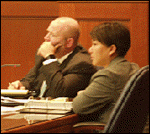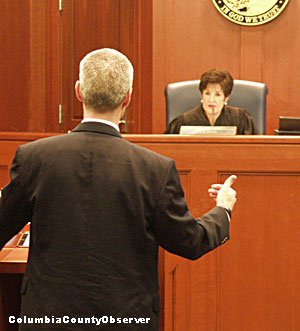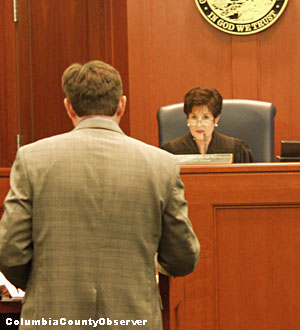Lifeguard Ambulance vs. The Cnty 5 – It's Now up to Judge Leandra Johnson: Part II, Court Hearing
Posted August 22, 2016 11:59 pm | Part I

Cnty Atny Joel Foreman. He did not look
happy.
COLUMBIA COUNTY, FL – At 2 pm sharp on August 18, 2016, Circuit Court Judge Leandra Johnson ran through a brief history explaining how the petitioner, Lifeguard Ambulance, and the respondent, Columbia County came to be in her courtroom; asked the parties to identify themselves; advised them that they would each have 30 minutes to present their sides; and the petitioner, Lifeguard, would be able to reserve part of that time for rebuttal.
Appearing for Lifeguard was Attorney Douglas M. Smith of the law firm of Hopping, Green & Sams. With him was the president of Lifeguard, Brett Javanovich. Making the argument for Columbia County was outside counsel Heath R. Stokley of Nabors, Giblin & Nickerson. The County Chairman, Sylvester "Bucky" Nash, chose not to show up. County Attorney Joel Foreman, who should have been at both the County meeting and in the court, was in court.
Terms you need to
know:
Petition for Writ of Certiorari (as it
applies to this case):
A petition for writ of certiorari is used to
review quasi-judicial orders of the county
commission. When the County 5 ruled on the
appeal of Lifeguard regarding the decision
of Purchasing Directory Ray Hill, the County
was acting in a judicial capacity (known as
quasi-judicial). The only way for Lifeguard
to appeal the decision of The 5 was by
filing a Writ of Certiorari, also known as a
cert, with the circuit court.
On certiorari review of
a quasi-judicial order by the County
Commission, the circuit court’s standard of
review is limited to determining whether the
County complied with procedural due
process, i.e., notice and hearing; observed
“the essential requirements of law”; and
based its ruling on competent, substantial
evidence. (Florida Bar)
Essential Requirements
of Law:
Beginning in 1894 the Florida Supreme Court
has been all over the court regarding what
are the "essential requirements of law."
According to the
Florida Bar, "It remains amorphous."
However, it is not enough to show mere legal
error — there must be a grave injustice as a
result of that error. The Florida Bar warns:
"Practitioners [attorneys] should understand
that this is a stringent standard that
reviewing courts take very seriously and
insist be satisfied as a condition for
relief by common law certiorari."
Competent,
Substantial Evidence: Evidence shall be
deemed competent to the extent that it
should be sufficiently relevant and material
so that a reasonable person would accept it
as adequate to support the conclusion
reached. Evidence shall be deemed
substantial if it will establish a
substantial basis of fact from which the
fact at issue can be reasonably inferred, or
such relevant evidence as a reasonable mind
would accept as adequate to support the
conclusion. (U.S. Supremes (1971); F.2d (9th
Cir. 1987)).
Lifeguard Addressed the Court
Attorney Smith ("Mr. Smith") explained the case to the court. They were there for a Petition for Writ of Certiorari; the court was sitting in an appellate capacity to look at quasi-judicial action taken by Columbia County Board of County Commissioners. They were there regarding a procurement process that involved ambulance services.
Mr. Smith continued, "The procurement office for the county opened up the bids. They realized Century's bid was missing some critical information. That is the mileage rates that citizens would have to pay for the services... They could have at that point said -- you know what -- we should go ahead and reject all bids. Or, we think what they should have done was said, look Century failed to submit this material information -- they ought to be rejected as responsive bidders."
"What they couldn't do under Florida law... was reach out to Century and say – 'Hey, send us the information you forgot to send us.' And the reason why is it's anti-competitive. The Florida courts have set a bright line standard. If you have information that's missing from your bid, once those bids are opened, you can't supplement your bid, because it's anti-competitive and it leads to cronyism and it's not in the public interest... To add insult to injury, not only was he not supposed to ask for the information, but he takes the information -- they score the information -- and they ultimately conclude based on that information, that's what really turns the scales here, that information makes a difference and ultimately Century is deemed the highest bidder."
Mr. Smith: The quasi-judicial hearing

Douglas Smith presents his case to Judge
Leandra Johnson
Mr. Smith explained, "We take it to the Board of County Commissioners for a quasi-judicial hearing... We get to create a record to ascertain why it is the County did what it did... We were denied that... When we went there we said we wanted to present evidence; we wanted to cross-examine the staff to find out why there's entirely different scoring in the criteria. We were denied that opportunity. That leads to the absence of competent and substantial evidence in the record, because even the County didn't bother to ask staff why it is you scored these things. It just simply wasn't done."
(It had been previously established that it was County Attorney Foreman who made the decision to deny Lifeguard the ability to call and question witnesses).
Mr. Smith continued, "We're here to ascertain whether they: followed the essential requirements of law; whether they followed procedural due process; and whether they based their decision on competent and substantial evidence in the record. And I want to emphasize -- competent and substantial evidence in the record. The total absence of the record I think prevents that in this case. I think they failed all three."
Mr. Smith explained that sometime after the quasi-judicial hearing the County 5 decided to reject all bids; rebid; and begin the processes all over again. The County 5 Puts Taxpayers on the Line, More Legal Fees on the Way, NGN Thinks it Has a Plan
Mr. Smith added, "Once we filed a protest the whole process had to stop and they lost the opportunity to reject all bids at that point... They could have rejected all bids at the County Commission hearing where we had a quasi-judicial hearing."
Judge Johnson asked Mr. Smith for the case law supporting his position. He provided the citations and added, "The process stops until the protest runs its course."
Mr. Smith told the court that the reason the County rejected all bids was to take the case away from the court. "They want to take the case away from you. The reason for rejecting all bids is because you want to take away the appellate rights of somebody else... There is no doubt what the intent was. It was to prevent my client from having his due process rights afforded."
The Essential Requirements of Law
Competent and Substantial Evidence
Mr. Smith told the court, "We have a violation of the essential requirements of law. The Harry Pepper case is a bright line ruling. It's good law. It's been followed through the state of Florida. You can't reach out and ask for a supplemental information that is material to the procurement. They're the one that identified the criteria that would be important in this. They're the ones that assigned scoring points to that particular criteria. How can they then come in and say it's not material?"
Mr. Smith addressed the court on the "glaring failure of due process -- not even being able to ask questions of staff. How is it that you rated Lifeguard's -- unintelligible -- Lifeguard has the most experience delivering primary EMS services... How is it that they came up with the scores they did? Doesn't the public want to know how these criteria came out ... Why was it that they came out with the kind of scores they did? We were denied that opportunity. And as such, I think -- unintelligible -- since the County did need to create a record, I would submit that you don't have competent and substantial evidence in the record to support the decision that was reached by the County Commission."
Finally, Mr. Smith told the court, "There is no competent and substantial evidence to support the decision that the scorekeeper made with respect to this procurement."
He concluded, "I would submit that there are issues here and that's supporting a process that requires objectivity and transparency, something that we just didn't have in this case."
NGN's Heath Stokley for Columbia County

Outside counsel, Heath Stokley, presents his
case to Judge Leandra Johnson.
Attorney Heath Stokley told the court, "I'm here today simply on oral argument on a petition for Lifeguard's writ of certiorari, only. And that is it. This is first tier cert review."
Mr. Stokley continued, "The court is basically tasked with three things and three things only in this review: as whether the essential requirements of law were observed; whether the administrative findings and judgments of the County are supported by competent and substantial evidence; and whether the procedural due process is accorded..."
Judge Johnson asked, "Can you address the argument that there's no competent substantial evidence in the record?"
Mr. Stokley answered, "I don't think that that is a criteria for a procedure that is set forth in the Columbia County purchasing policies. And that is not something that is -- I don't believe -- even set forth in the procurement law that is set forth -- that is cited before the court... It is a hearing process that's based on the review of written submissions and a written record. It is not a formal hearing. The purchasing policy then says whatever decision comes about is appealable through a petition for writ of certiorari to the Circuit Court... The case law that talks about the rights to cross-examine witnesses and make presentations that are cited here all comes within a zoning and land-use context, not a procurement process context. And that is separate and distinct and really it's all – unintelligible -- with regard to the nature of the decision that is being made by the Board of County Commissioners."
Judge Johnson asked, "What is the difference? Are they not both quasi-judicial proceedings?"
Mr. Stokley answered, "They're different quasi-judicial proceedings I would say."
Judge Johnson followed up, "Sure, the nature of it is different, but in terms of due process?"
Mr. Stokley answered [as spoken], "Even the nature of -- I think the nature -- what you're saying you're allowed to do or present or cross examine or call witnesses is a little overstated even in the -- Lifeguard is -- the process that is allowed is if witnesses are called you get to -- to -- to cross-examine, but ah -- the public hearing process is not as formal and stringent as what would have been here in this courtroom with the trial. So, I think those cases are especially distinguishable." (Lifeguard's cases)
Mr. Stokley continued to maintain that a quasi-judicial zoning hearing and the quasi-judicial procurement hearing held by the County Commission were different.
Mr. Stokley maintained that the June 2 rejection of all bids by the County 5, after Lifeguard filed its writ a month before, was not improper.
The "issue is moot"
He told the court, "That issue is moot. The County through its board action at the meeting held on June 2, 2016, essentially exercised the discretion that was provided to it within the RFP; within purchasing policies; and within the case law that is set forth to essentially say -- okay, the decision we made in April, we are receding from that. We are starting over. We're not awarding the contract under that RFP to Century. That RFP is dead. We're drafting a new RFP with different terms and conditions... and we're starting over... The County always had the authority to reject all bids and re-advertise for new bids."
A little later on, Mr. Stokley told the court, "There is just not any case law on point that would support the legal proposition that Lifeguard is presenting to this court that essentially a local government governing body, in this case the board of County Commissioners, is divested of its home rule powers or authority to make decisions for the local government once a lawsuit or petition is filed with the circuit court. That's just not the case... So we believe as outlined in our response this issue is essentially moot. There's been a new RFP issued... I believe Mr. Hill's conclusion that the omission of mileage was immaterial was supported."
Judge Johnson asked, "What about with his contact to obtain that information. Is it your position that there's no impropriety, or illegality met?"
Mr. Stokley answered, "I don't think it's -- no -- not I think within the purchasing policies. Technical deviations and requests for additional information that is not material is permissive. So as long as it's immaterial and it is not -- unintelligible -- at the size of the contract, then I think that..."
Judge Johnson: "The petitioners say it was a big thing to the County."
Mr. Stokley: "What?"
Judge Johnson: "The petitioners argue that it is -- that it was -- a big thing to the County. That is a big issue and material issue."
Mr. Stokley responded, "We disagree with that. I think Mr. Hill's [Purchasing Director] response and the way that this request for services was set out, was that the mileage was -- that was omitted -- was one of a multitude of different pricing information that would go into a bill to users of the service. The County itself does not pay anything for the 911 ambulance service. It's the end user of these services that ends up paying either - either the person transported or an insurance company.... The charges is just one of many things that went into the calculus of who would be the best and most capable ambulance service provider for the next contract period... And the other issue that they raised was the disclosure of litigation and regulatory action. That was actually disclosed."
Mr. Stokley concluded for the County, "In closing, the County believes that the relief requested by Lifeguard has essentially been mooted. It's already been done. The County has issued a new RFP."
Lifeguard's Final Bite at the Apple
Mr. Smith addressed the court, "This is important stuff... I know you heard today that we shouldn't get this relief because we rejected all bids. The reality is we followed their process from the beginning. They're going to quibble with what the legal requirements of that process were... Their policy says, 'upon receipt of the protest notice, the purchasing director will suspend the process for award of the bid until the process is resolved, unless you have a declaration of health, safety, welfare' -- which didn't happen in this procurement. The process was suspended under their rules. That's not my rules... If the board of County Commissioners rules and that's a final ruling by the way. It's a final decision of the County Commission, then we have a right to go to your honor to test that decision under the cert standard of review."
He continued, "... They created a process that was heightened, Judge. They created a process that said, 'No, we're going to look deeper into this. We're going to look for competent and substantial evidence in the record. We're going to look for following the essential requirements of law. We're going to follow procedural due process...' I'm asking you to look at what happened below and say, wait a second -- where's the process here? Where is the transparency? And how is it that they can get away with this clear violation of the Harry Pepper case. I think we demonstrated the violation of the essential requirements of law; lack of evidence to support the decision and lack of procedural due process."
Judge Johnson asked, "What do you see as the relief?"
Mr. Smith asked the court to find Century non-responsive and remand the decision back to the County for further disposition.
Epilogue
Judge Johnson advised the parties, "The court will issue a ruling opinion in the next eight days – a written opinion."

